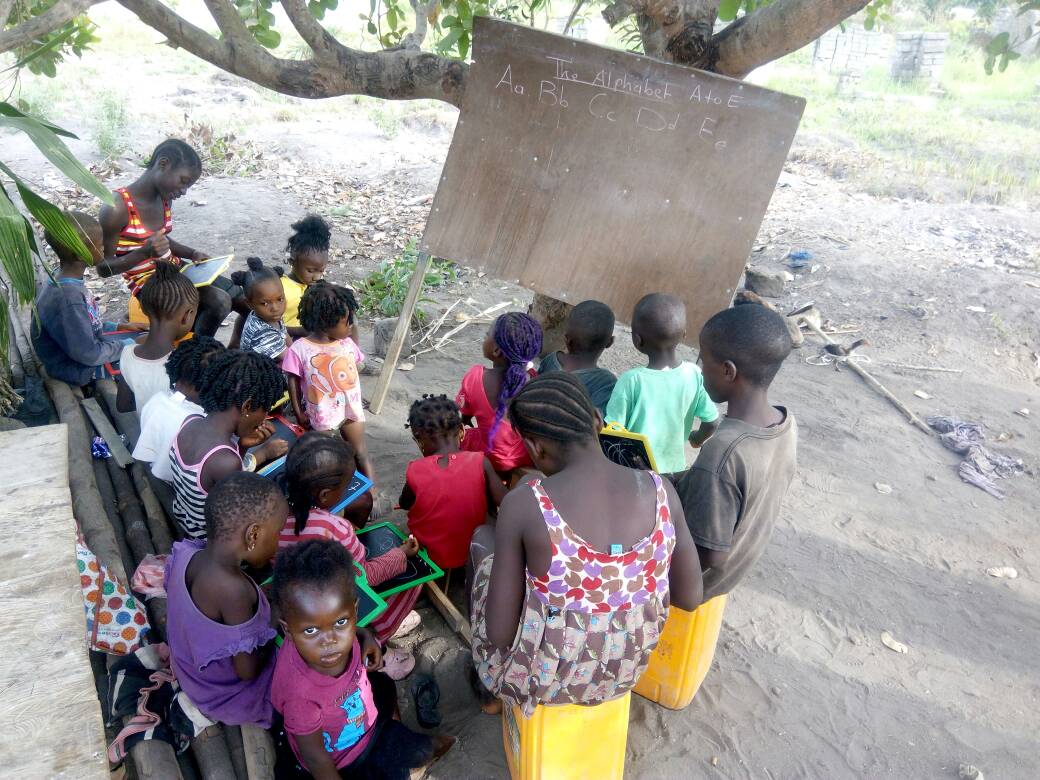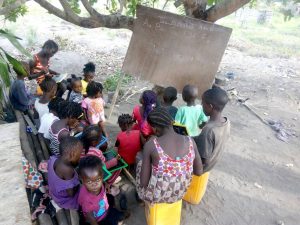
Shieldra School Amputee Village
 The first blog I ever wrote was given the title of ‘Under the Mango Tree’. It referred to my first visit to Sierra Leone and I wrote of sitting under the mango tree in the village of an evening listening to the chatter and laughter of the community.
The first blog I ever wrote was given the title of ‘Under the Mango Tree’. It referred to my first visit to Sierra Leone and I wrote of sitting under the mango tree in the village of an evening listening to the chatter and laughter of the community.
ARET recently received an application for funding a seven classroom building in a village called Amputee. The phrase ‘under the mango tree’ came up in the application and I was intrigued. Here the mango tree was not a gathering place for exchanging news and general chat but was a shelter for learning.
Amputee Village came into existence after the long brutal civil war in Sierra Leone (1991 – 2002). It was in this community in Western Rural Area near Waterloo that victims from the war settled. As the name of the community suggests many had their hands and/or feet chopped off, some were blinded and the young women abused and raped by the rebels. The poverty in the village was extreme. As Sierra Leone struggled to build itself up again they then had to deal with the Ebola crisis and the Western Rural area was badly hit. The economy suffered badly. Education in Sierra Leone, once known as the Athens of West Africa, became difficult to access for many and impossible for a great deal others.
I was very fortunate to meet two dedicated teachers during one of my visits to Sierra Leone. We kept in touch and they spoke of Amputee Village children who would come to the houses of teachers living near by asking for pencils and paper so they too could learn to write. There was a huge appetite to learn and teachers the world over  cannot help but respond when faced with it. The children were gathered under the village mango tree, some basic items were bought and a young teacher volunteered to teach for a much reduced salary. This salary was paid by local teachers contributing from their own inadequate salary. The ‘school’ was called Sheildra (Shield) because these children needed some form of protection against the troubled times they live in. The school age children came but were soon joined by young teenagers and then adults who had missed out on any form of formal education. Sadly, after long meetings with the community they decided that the school under the mango tree had to be for Primary school age children only. They would however seek funding to buy the plot of land and build a basic school of seven classrooms.
cannot help but respond when faced with it. The children were gathered under the village mango tree, some basic items were bought and a young teacher volunteered to teach for a much reduced salary. This salary was paid by local teachers contributing from their own inadequate salary. The ‘school’ was called Sheildra (Shield) because these children needed some form of protection against the troubled times they live in. The school age children came but were soon joined by young teenagers and then adults who had missed out on any form of formal education. Sadly, after long meetings with the community they decided that the school under the mango tree had to be for Primary school age children only. They would however seek funding to buy the plot of land and build a basic school of seven classrooms.
They were invited to apply to ARET for a grant. After reading the application form it did not take the trustees long to agree a school had to be built. This was something we had not expected to do and the project is larger, even although the classroom buildings are modest, than we budgeted for. However the circumstances are exceptional.
Not only are the original members of the community limited in their earning capacity the village has no electricity and their water is not good. What meagre wages they can earn from gathering clay and sand for brick making is insufficient to feed their families. Education is valued and seen as the means to break the poverty cycle. Many of the women in the community have no education; many of the girls who left to attend school in another village returned home having been sexually harassed and now pregnant; others are still traumatised from the Civil War and have serious mental health problems.
The school building may be modest but their dreams are not. They are however taking one step at a time. First build the school, then think about the furnishing and basic educational materials and employment of teachers. The school is currently a Rural Community Initiative and they will somehow have to find financial assistance to pay the teachers. But that is not all. The women want basic literacy skills, the teenagers want to attend school too, the young men think it could be a place where work skills could be taught in the evening.
Certainly, this community is wanting to be empowered. We wish them every success and hope to see the new school later this year when Rachel and I return to Sierra Leone to visit the project.
To what extent ARET will be able to support this project remains to be seen but certainly we hope to walk with them part of the way. As they do not have internet access we can at least raise awareness on their behalf.
This post will be developed late September after we have visited Amputee Village and spoken with the main organisers and have some understanding of what is required for the next steps.


